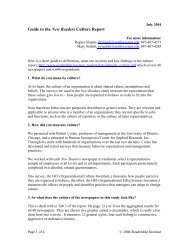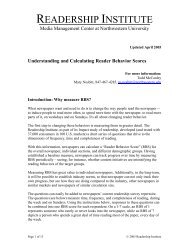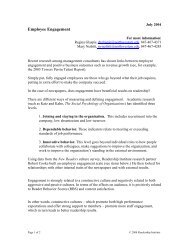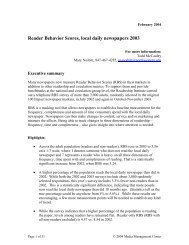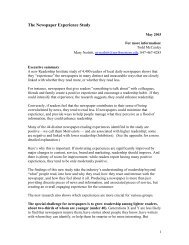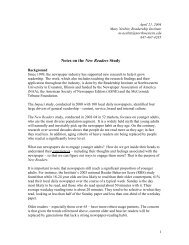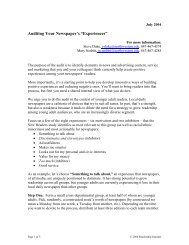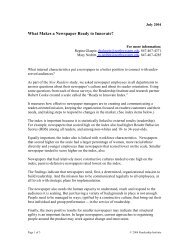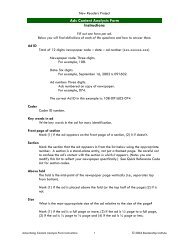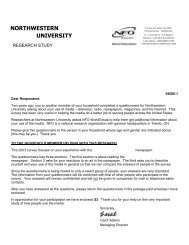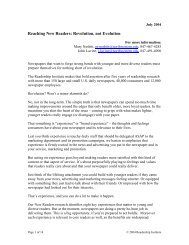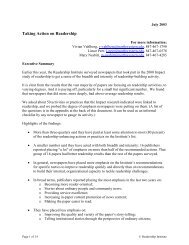U.S. Daily Newspaper Readership During the War with Iraq
U.S. Daily Newspaper Readership During the War with Iraq
U.S. Daily Newspaper Readership During the War with Iraq
You also want an ePaper? Increase the reach of your titles
YUMPU automatically turns print PDFs into web optimized ePapers that Google loves.
Highlights of <strong>the</strong> war study findings:<br />
• This kind of event is an opportunity for newspapers to increase readership<br />
among desired groups – Reader Behavior Scores increased 5% for light readers<br />
after <strong>the</strong> war in <strong>Iraq</strong> began (though readership did not increase for heavier<br />
readers).<br />
• While riveting news events draw people to newspapers, <strong>the</strong> challenge is how to<br />
get <strong>the</strong>m to “stick.” Light readers were less satisfied and felt less positively about<br />
<strong>the</strong> newspaper than did medium and heavy readers, in terms of both coverage of<br />
<strong>the</strong> war and o<strong>the</strong>r non-war topics.<br />
• Interest in war news was very high. Most consumers (85%) said <strong>the</strong>y followed<br />
<strong>the</strong> news fairly or very closely. Men reported following <strong>the</strong> news about <strong>the</strong> war<br />
more intensely than women and older consumer more intensely than younger.<br />
• Usage was up across all media, particularly television. Nearly half of<br />
respondents (47.3%) said <strong>the</strong>y read <strong>the</strong> newspaper more closely.<br />
• All readers rated <strong>the</strong> war as <strong>the</strong> most important news during that period, but<br />
interest in o<strong>the</strong>r kinds of news remained robust. This indicates that at a time<br />
when resources and energy are focused on reporting and presenting a large and<br />
complicated news event, much attention still needs to be paid to o<strong>the</strong>r kinds of<br />
news and information.<br />
• Consumers were generally satisfied <strong>with</strong> newspapers’ coverage of <strong>the</strong> war and<br />
<strong>the</strong>y generally have positive feelings about <strong>the</strong> newspaper-reading experience –<br />
<strong>the</strong>y tended to agree that, for example, newspapers give a local perspective on<br />
<strong>the</strong> war or a context to better understand current events.<br />
• <strong>Newspaper</strong>s performed fairly well overall, but o<strong>the</strong>r media were perceived to be<br />
better. There are serious challenges for newspapers in dealing <strong>with</strong> competitors<br />
that have both natural advantages – like speed, immediacy, sound and video –<br />
and aggressive and creative approaches to making content and marketing it.<br />
• Television fared better than newspapers on most measures of consumers’<br />
perceptions, including those that newspapers think of as core competencies,<br />
such as most accurate, most expert and most complete.<br />
• The study provides details on <strong>the</strong> kinds of war-related coverage that interested<br />
readers in general, and different types of readers in particular. For instance, light<br />
readers would have been more satisfied <strong>with</strong> more content relating to personal<br />
safety (how to keep myself and my family safe at home, and how to keep safe<br />
while traveling); more explanatory visual information (maps, graphics and charts);<br />
and stories about longer-term implications (how post-war <strong>Iraq</strong> will be rebuilt and<br />
governed, how <strong>the</strong> war affects <strong>Iraq</strong>i citizens, <strong>the</strong> impact of <strong>the</strong> war on <strong>the</strong> stature<br />
of <strong>the</strong> U.S. in <strong>the</strong> world).<br />
The following sections explain <strong>the</strong> survey methodology and <strong>the</strong> findings in more detail.<br />
2 of 20 © <strong>Readership</strong> Institute



